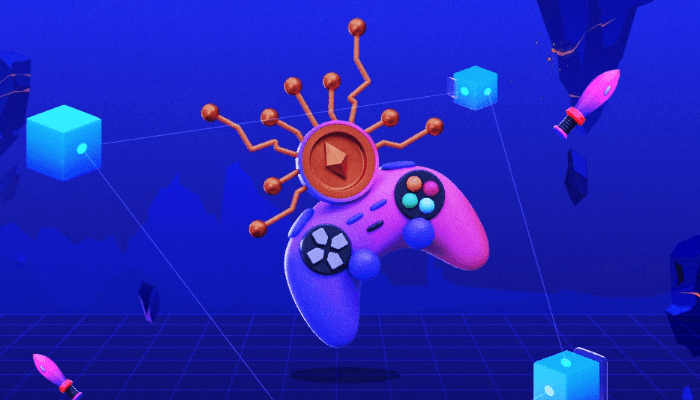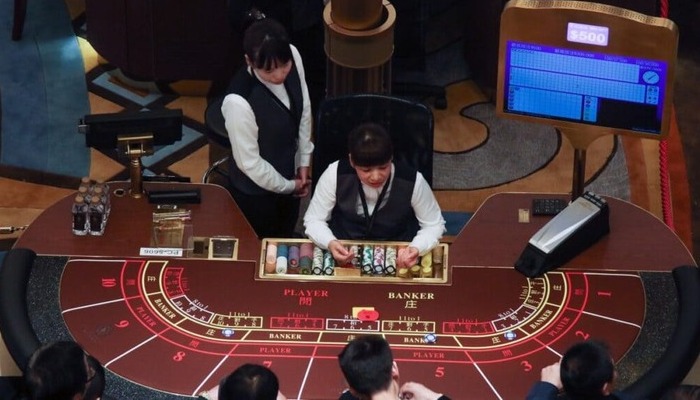
How is the Gaming Industry being Revolutionized by Blockchain?
1. How does GameFi operate and what is it?
The phrase “game finance,” or “gameFi,” refers to the integration of traditional gaming and decentralized finance (DeFi) through the use of blockchain technology.
With the use of play-to-earn blockchain games, GameFi uses blockchain technology to build decentralized gaming markets that provide players with a variety of financial incentives and chances. By playing games or taking part in various activities within the gaming industry, players can earn bitcoin. In contrast, firms with historically low profit potential have largely maintained the traditional gaming sector.
Since the emergence of Axie Infinity, GameFi has quickly changed the landscape of the traditional gaming industry. Platforms like Axie Infinity are a popular investment choice for crypto gaming aficionados since the Ethereum-based platform has created a new gaming model that compensates players for the time and effort spent playing the blockchain game instead of just the money they put in.
Typically, GameFi entails the development of gaming tokens or NFTs that can be used as in-game items like virtual real estate, avatars, weapons, outfits, or money that can be exchanged on cryptocurrency exchanges. By engaging in different game-related actions, such as finishing missions, triumphing in combat, or staking tokens, players can acquire these tokens.
These tokens can then be used to buy in-game things, engage in trades with other players, or convert to fiat money or other cryptocurrencies. Additional DeFi features like yield farming, staking, and liquidity supply might be available on GameFi platforms.
In general, GameFi provides players with a fresh and fun method to make money while enjoying their favorite games. DeFi investors can profit from their digital assets while taking part in the game industry.
2. How is the gaming business being affected by blockchain?
For businesses and the gaming community, a new crypto-gaming model has evolved that makes use of NFTs and cryptocurrencies for in-game asset purchases that can be converted into real-world cash.
With protected data encryption and no centralized servers that may be easily breached by attackers, this new approach employs decentralized networks to make gaming more secure. Because blockchain transactions are unchangeable, fraudsters have a hard time gaming the system. Blockchain also offers a decentralized and open ledger, enabling participants to easily trace their transactions and assets.
A more open and transparent economy is made possible by these decentralized markets, allowing users to purchase, sell, and exchange assets without the aid of middlemen like game publishers or developers. The majority of blockchain gaming is similarly run by the community, with players deciding on new features, upgrades, and the overall course of the network.
Blockchain gaming enables real ownership of in-game items, enhancing competition above conventional market-available competitive games. In order to make them distinct and verifiable, these items can be 3D props, characters, furniture, tools, vehicles, weapons, and anything else that can be stored on the blockchain as NFTs.
Players have more control over their gaming experience when they have such ownership. It enables them to monetize their assets, which can be traded on cryptocurrency exchanges for actual money and transferred outside of virtual games.
The majority of blockchain-based games allow players to make secure payments using native crypto tokens, which are practical and might make good investments. As transactions are verified and recorded on the blockchain, they are also safe.
3. What advantages does blockchain have for the gaming sector?
By 2028, the market for blockchain-based gaming is expected to be worth $435 billion, representing a record compound annual growth rate (CAGR) of about 12.1% from 2022 to 2028.
The COVID-19 epidemic, which compelled individuals to stay at home and play with the novel games model, has contributed to significant growth, according to a research published in 2022 by Zion Market Research.
Since then, major firms in the gaming industry have shown a growing interest in cryptocurrency games and have incorporated blockchain technology into their products to stay on the cutting edge of the industry’s innovation.
The following are some of the most widespread advantages of applying blockchain technology in the gaming sector:
• Blockchain technology enables the creation of safe digital identities and reputations for players. The gaming business can be protected from fraud by using these IDs to verify participants.
• Secure and transparent transactions: Blockchain offers the gaming industry high security and transparency. Because blockchain transactions are speedy, transparent, and immutable, it is challenging for scammers to manipulate the system.
• Control by players: Users are fully in charge of their gaming experience, with the option to monetize their assets, define the rules and mechanics of the game, upgrade features, and add new content for a more engaging one.
• Players’ security: Thanks to the decentralized structure of the blockchain, users may play games and control their in-game assets in a safe environment that is less susceptible to cyberattacks. They can more effectively manage and store their gaming winnings thanks to such security.
• A safe atmosphere for business owners and game developers: A secure working environment is provided by strong data encryption and the absence of single servers. In a decentralized blockchain network, nodes are responsible for jointly maintaining distributed databases, with each node possessing the entirety of the database.
• Interoperability: Players can carry their public address from one game to the next and utilize it for transactions on other blockchain platforms.
Blockchain’s immutability and security are proving to be quite helpful in the gaming industry.
Decentralization empowers players to take part in the creation and development process while generating revenue from their crypto assets. The many applications it has been transforming how games are created, owned, and played.
4. What drawbacks exist with blockchain gaming?
Blockchain-based gaming platforms innovate the sector, however, there may be drawbacks that deter players from using them.
Despite the fact that blockchain technology has several advantages for the gaming business, including the above-mentioned use cases, there are a few potential downsides that players should carefully consider:
• Technical difficulty: Blockchain technology implementation in games involves technical know-how and may be difficult for creators who are not familiar with the technology. It may become more expensive and time-consuming to build games as a result of this intricacy, making it harder for smaller creators to get into the market. The technical sophistication needed to use blockchain and cryptography, such as creating a crypto wallet and purchasing cryptocurrencies or NFTs before being allowed to participate, may deter game players as well.
• A small number of blockchain-based video games: Blockchain games can’t currently offer a competitive environment for seasoned gamers who may not feel driven to join the ecosystem because the gaming industry is still relatively young.
• Scalability: With blockchain technology, scalability is one of the primary issues. If adoption increases, blockchain networks may find it difficult to handle the enormous transaction volumes needed for online gaming. Poor user experiences, lengthy transaction times, and expensive transaction fees may result from this.
• Uncertainty surrounding regulation: The regulatory environment for blockchain technology is still developing, and there is significant ambiguity regarding how blockchain games will be governed in various jurisdictions. For developers, this ambiguity may present concerns related to the law and compliance.
• Security concerns for cryptocurrency tokens: While blockchain technology is decentralized and secure, centralized service providers are more susceptible to hacking and other illegal activity.
While blockchain-based applications are gaining popularity in the gaming industry, developers, investors, and players should weigh all the benefits and hazards before integrating blockchain technology into their games or taking part in the ecosystem.
5. What prospects does blockchain gaming have going forward?
It’s only reasonable to think about the future of the industry as blockchain gaming develops and is more used in entertainment.
Blockchain gaming has a bright future and is projected to experience tremendous growth over the next few years, including widespread acceptance as more companies implement blockchain technology. Blockchain technology may be incorporated by more conventional game producers, resulting in a rise in its popularity.
Overcoming access hurdles for players and companies will be one of the main challenges for blockchain gaming. Emerging market participants with a focus on decentralization and user ownership of in-game assets include DeFi Kingdoms, 0xBattleGround, and CryptoBeasts. This lowers entry barriers for new players and promotes greater participation and engagement across the board in the gaming sector.
The adoption of blockchain-powered NFTs has the potential to shape the future of the gaming industry by giving gamers more control and ownership over their virtual assets. As shown by a battle royale game, blockchain-based games can use NFTs to verify users and get rid of bad actors, making the gaming experience safer and more open.
Users can also make money from virtual items outside of the game environment by having access to NFTs that act as substitutes for in-game assets. Users may have access to new sources of income as a result, helping to promote a more decentralized and ethical gaming business.
Further technological developments are anticipated as blockchain continues to gain popularity, enabling even more creativity in gaming experiences. Improved integration with other technologies like virtual reality, as well as more advanced token systems and smart contracts, may be examples of this.
Future blockchain-based gaming platforms may put more emphasis on increased interoperability to enable greater communication between game networks. In order to create a more fluid and integrated gaming experience, players can use their assets across different games and platforms.
The inclusion of more sophisticated DeFi capabilities in blockchain games, such as staking, yield farming, and liquidity provision, would provide a greater integration of blockchain gaming and DeFi.
Without question, the gaming business has the capacity to provide players with exciting and unique new experiences, all while maintaining a favorable sustainable environment. Will it be up to the task of supplanting the established gaming industry? Time can only be the one to tell!
Other Interesting Articles
 Vietnamese Gambling Games Worth Checking Out
Vietnamese Gambling Games Worth Checking OutMay 22, 2023











